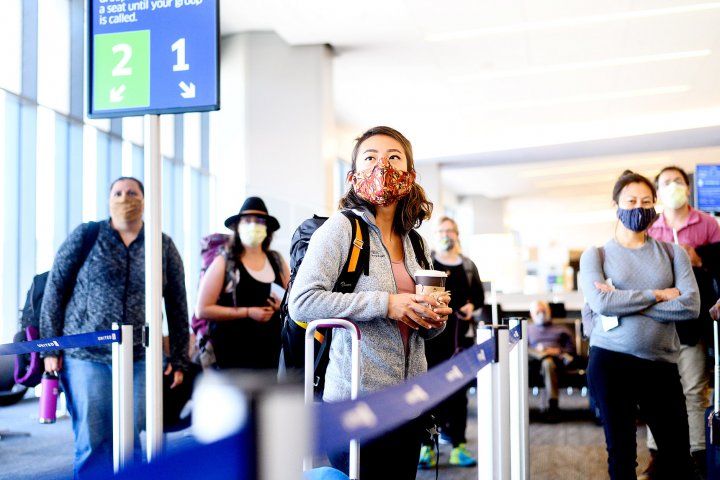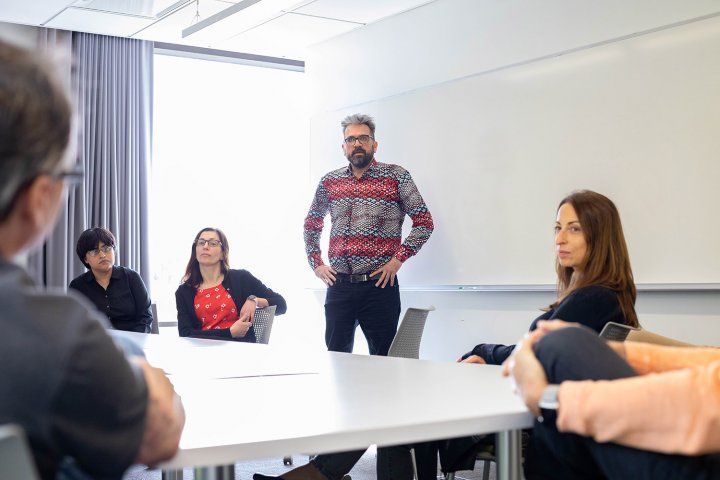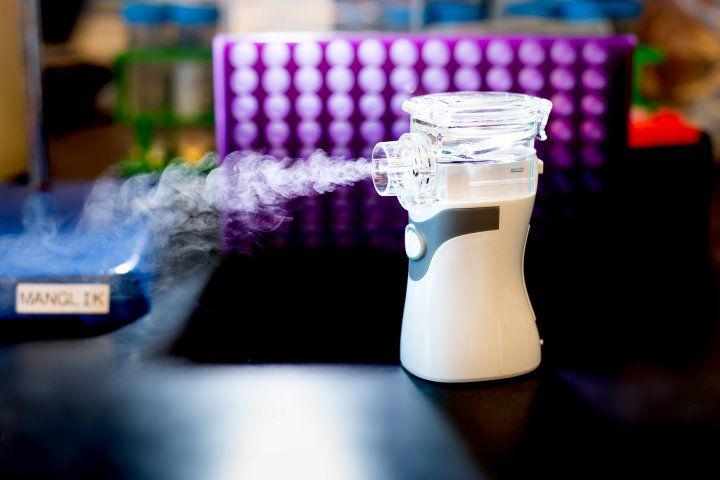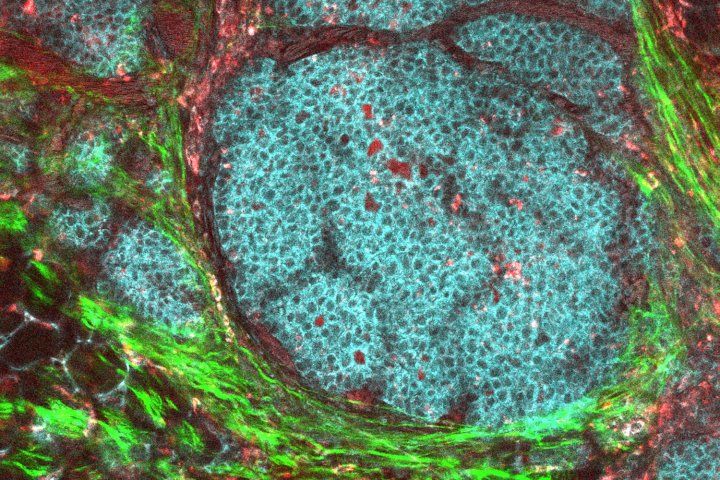The Highlights of 2020 at UCSF
It was the year of COVID-19. Of racial reckonings. Of political unrest and transition. Amid these historic events, UCSF adapted, endured and excelled.
Take a look through some of our highlights of 2020, from how we rallied to address a global pandemic, to how we advanced health and science in myriad other ways despite the existing challenges.
Browse the timeline below, organized by the following color key:
Institution | COVID-19 | Patient Care | Research | Education

Jan. 1
Reign of Research: For the 13th year in a row, UCSF claimed the top spot among public institutions in funding from the National Institutes of Health. The University was awarded nearly 1,300 NIH grants and contracts, totaling more than $684.4 million in funding in 2019.

Jan. 24
A Novel Virus: A mysterious outbreak centered in Wuhan, China, draws attention from around the world. UCSF infectious disease experts begin to answer questions about what we know and what we should do to prepare as it would soon hit home.

Jan. 30
Dentistry Donation: An alumnus’ $10 million gift to the School of Dentistry – its largest ever – strengthened the school’s development of a modern curriculum, recruitment and retention of world-class faculty, and professional development and mentorship programs for junior faculty.

Feb. 3
East Bay Expansion: The UCSF-John Muir Health Cancer Center opened in Berkeley, the first significant milestone in developing a cancer network to enhance access to cancer care throughout the East Bay. There are now 19 specialty care services available at the Berkeley Outpatient Center.

Feb. 13
Surgeon General Visits: Nadine Burke Harris, California’s first surgeon general, delivered the Chancellor’s Annual Health Policy Lecture, speaking about her groundbreaking work to reduce adverse childhood experiences across the state.

March 16
Shelter In Place: With nearly 300 coronavirus cases logged in the Bay Area, six counties – including San Francisco – issued a shelter-in-place order. UCSF Health enacted visitor restrictions in the hospital, as thousands of employees and learners began adapting to remote work.

March 17
High Marks: UCSF’s professional schools excelled in this year’s U.S. News & World Report Best Grad Schools survey: Medicine placed in the top six for the 11th consecutive year, and Pharmacy's PharmD program ranked second. Five of Nursing’s specialties made the top six, and the school ranked 11th overall.

March 20
Testing Ramp-up: To address the urgent need to expand COVID-19 testing, Joe Derisi, PhD, led an effort, with support from the Chan Zuckerberg Initiative, to build a testing lab from scratch in just eight days, staffed by graduate students and fellows. By mid-April, the lab was able to offer free test processing to all California county public health departments.

April 2
Pitching Tents: UCSF Health worked swiftly to set up COVID-19-safe testing and screening sites, establishing drive-through testing at Laurel Heights and erecting specialized Accelerated Care Units (ACUs) outside the Parnassus Heights and Mission Bay hospitals to screen patients with respiratory illnesses.

April 3
Mapping Health Data: The UCSF Health Atlas launched to curate publicly available data and visualize it at the census tract level, enabling researchers to explore neighborhood-level COVID-19, food security, housing insecurity, and cancer characteristics and see how they relate.

April 10
Heading to Hotspots: San Francisco was an early success story in controlling COVID-19, but UCSF clinicians weren’t content to rest. Dozens of volunteer nurses and physicians headed to New York City and Navajo Nation to help where it was needed most. In addition to providing support, they were able to learn and gain experience in responding to a sustained surge.

April 23
Eradicating Another Virus: The world nearly eradicated polio by 2017, but the effort stalled with current vaccines. Raul Andino, PhD, co-led a study of the world’s first new polio vaccine in a half-century, clearing a Phase 1 clinical trial and bringing the promise of finally reaching eradication.

April 27
Testing the Tests: A project launched by UCSF and UC Berkeley scientists began evaluating the more than 120 available antibody test kits, used to determine who has been infected with COVID-19 and may be immune and who is still susceptible, bringing scientific rigor to a “Wild West” of public health.

April 29
Reopening Mount Zion: After transitioning inpatients out of the Mount Zion campus in 2015, UCSF worked quickly to open a 53-bed respiratory isolation unit there that would serve as UCSF Health’s primary site for caring for patients with COVID-19.

April 30
Blocking Coronavirus: Nevan Krogan, PhD, convened an international team of more than 120 scientists to create a “blueprint” of more than 300 human proteins that the SARS-CoV-2 virus needs to infect cells and detailed how 75 drugs might block infection.

May 4
Training the Tracers: UCSF partnered with state officials to facilitate the training of 3,000 people a week in public health techniques and strategies, including contact tracing, case investigation and administration, to limit the ongoing spread of COVID-19.

May 22
Virtual Founders Day: UCSF’s annual Founders Day celebration went online for the first time, honoring 13 faculty, staff, and learners in a Zoom event for their public service, excellence in nursing, and contributions to the University.

May 27
Million-Dollar Molecular Research: David Julius, PhD, was awarded the 2020 Kavli Prize in Neuroscience for his foundational work on the mechanisms that allow us to feel heat, cold and inflammation. He shared the $1 million award with Scripps Research’s Ardem Patapoutian, PhD, “for their transformative discovery of receptors for temperature and pressure.”

May 27
Stroke Certification: The UCSF Stroke Center at Parnassus Heights announced its designation as a Comprehensive Stroke Center, the highest and most demanding certification awarded to hospitals that can treat the most complex stroke cases.

May 28
Helping the Underserved: From COVID-19 testing for underserved neighborhoods, to nursing students working with unhoused individuals to prevent spread, UCSF honored its public mission in a number of programs to serve our community’s most vulnerable populations.

June 1
Joining the Frontlines: Commencement looked very different this year, as nearly 1,000 students graduated at UCSF. Entering the health workforce during a global pandemic, their skills – and their mission – were more important than ever.

June 10
Black Lives Matter: As people rose up nationwide following the police killings of George Floyd and Breonna Taylor, members of the UCSF community united in calls for racial justice, organized and joined peaceful protests on and off campus, and launched a review of UCSF’s own campus safety practices and policies.

June 15
Video Game Therapy: The U.S. Food and Drug Administration approved the first video game therapeutic as a treatment for attention deficit hyperactivity disorder (ADHD) in children, based on 2013 research by Adam Gazzaley, MD, PhD, that found a game he developed could improve attention in older adults.

July 6
Historic AIDS Conference: The 23rd International AIDS Conference had been scheduled to return to San Francisco for the first time in decades, with UCSF’s Monica Gandhi, MD, MPH, as the scientific co-chair. Moving online due to COVID-19, participants examined the lessons from controlling a once-mysterious infectious disease.

July 7
Hospital of the Future: UCSF selected its architect for a proposed new hospital at UCSF Helen Diller Medical Center at Parnassus Heights, part of a vision for a campus transformation that will strengthen UCSF’s world-renowned clinical, research and training mission.

July 7
New UC President: Michael V. Drake, MD, who spent more than two decades as UCSF faculty, was named the 21st president of UC’s world-renowned system of 10 campuses, five medical centers, three nationally affiliated labs, more than 280,000 students and 230,000 faculty and staff.

July 10
Conversation on Race: The 2020 UCSF Medals celebration turned into a timely discussion on race, as UCSF bestowed its highest honor on three national leaders – John A. Watson, PhD; Afaf Meleis, PhD; and Freeman Hrabowski, III, PhD – all of whom led through mentorship that has helped to place more underrepresented voices in the sciences.

July 28
Best Hospitals: For the 22nd year, UCSF Medical Center was recognized as one of the nation’s finest in the U.S. News & World Report Best Hospitals survey. UCSF ranked eighth on the national Best Hospitals Honor Roll and in the top 10 in 10 specialties, including neuro, diabetes, and cancer.

Aug. 11
Inhalable PPE: As the world awaited vaccines to control the COVID-19 pandemic, graduate student Michael Schoof led a team that engineered a synthetic molecule that can be inhaled via aerosol to straitjacket the crucial SARS-CoV-2 machinery that allows the virus to infect cells.

Aug. 26
Speaker Stops By: Reflecting UCSF’s longtime partnership with federal policymakers, House Speaker Nancy Pelosi joined Chancellor Sam Hawgood for a special town hall to discuss the role of science and science advocacy in shaping policy during the COVID-19 pandemic.

Sept. 7
Plug-and-Play Prosthesis: Researchers working toward a brain-controlled prosthetic limb at the UCSF Weill Institute for Neurosciences showed that machine learning techniques helped a paralyzed person learn to control a computer cursor using their brain activity without requiring extensive daily retraining.

Sept. 9
Orange Horizon: As the pandemic pushed people outdoors more, California’s raging wildfires pushed people back inside. The climate threat became visceral when conditions turned Bay Area skies a blazing orange, blocking the sun for several days.

Oct. 7
COVID-Safe Learning: Classrooms were a lot quieter this fall, as thousands of students headed back to UCSF. Educators had to balance innovative distance learning with safely bringing learners into simulation labs, clinical settings and research labs for hands-on lessons. They also saw an opportunity to make the curriculum more relevant.

Oct. 19
Genetic Toolkit: Days after UC’s own Jennifer Doudna won a Nobel Prize for developing CRISPR gene editing, Joseph Bondy-Denomy, PhD, and his team published a significant advancement of the technology: a new CRISPR-Cas3 system that can remove much longer stretches of DNA quickly and accurately.

Oct. 20
Renowned Research: UCSF ranked among the top 10 in 11 specialties in this year’s U.S. News & World Report’s Best Global Universities survey that assesses research excellence. Overall, UCSF maintained its No. 15 place among the world’s top universities.

Oct. 21
Children’s Hospitals Leadership: The UC Board of Regents approved the appointment of Matthew Cook to lead UCSF Benioff Children’s Hospitals. Cook, president of Riley Children’s Health and chief strategy officer for Indiana University (IU) Health, officially joins UCSF on Dec. 31.

Oct. 24
Campaign Closes: UCSF’s multi-year fundraising initiative officially closed, having far exceeded its $5 billion goal. All told, almost 160,000 donors made more than 280,000 gifts during UCSF: The Campaign, which raised nearly $6.2 billion to support our mission to advance health worldwide.

Oct. 30
Addressing an Extraordinary Year: The annual State of the University Address went virtual, as Chancellor Sam Hawgood highlighted UCSF’s resolve and resilience. “The unpredictability of the major events that have reshaped our lives have created the sense that everything has changed. But what hasn’t changed is our mission and commitment to the communities we serve.”

Nov. 9
Transitioning With Science: Days after winning a historic election, President-elect Joe Biden and Vice President-elect Kamala Harris announced a COVID-19 advisory board, a panel of public health and scientific experts that included three UCSF faculty members: David A. Kessler, MD, JD, Eric Goosby, MD, and Robert M. Rodriguez, MD.

Nov. 9
Vision Center Opens: UCSF brought its top-ranked vision care and research under one roof with the opening of the UCSF Wayne and Gladys Valley Center for Vision at Mission Bay. The complex, which includes a 12-story office tower, will serve an estimated 160,000 patient visits each year.

Nov. 26
Cancer Smart Therapy: Teams led by Wendell Lim, PhD, combined cutting-edge therapeutic cell engineering with advanced computational methods to develop new “smart” cell therapies for cancer – living medicines that remain inert unless triggered by combinations of proteins that only ever appear together in cancer cells.

Dec. 1
Reversing Mental Decline: Just a few doses of a drug called ISRIB can reverse age-related cognitive decline, according to a study by Susanna Rosi, PhD, and Peter Walter, PhD. The study, in mice, showed for the first time that a significant component of these cognitive losses may be a reversible physiological “blockage” rather than more permanent degradation.

Dec. 1
Better Prostate Cancer Imaging: UCSF and UCLA obtained approval from the U.S. Food and Drug Administration to offer a new imaging technique for prostate cancer. Prostate-specific membrane antigen PET imaging, or PSMA PET, can identify prostate cancer spread that’s often missed by current techniques.

Dec. 16
Vaccine Arrival: Less than a year after the start of the global pandemic, UCSF received its first doses of the Pfizer COVID-19 vaccine, as hospitals across California begin distributing it to frontline workers. The delivery of vaccines was met with hope, relief and tears of happiness.

Year in Review
Amid the challenges of 2020, the tenacity of the UCSF community has allowed us to shine.